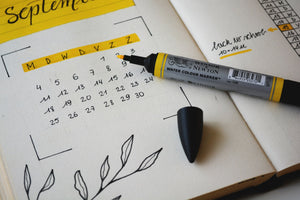Have you heard that journaling can do wonders for a person’s mental health? If you or someone you care about is dealing with depression, anxiety, or high levels of stress, you may be wondering whether starting a journal is a good idea. Today, we’re going to explore the various benefits of journaling for mental health. We’ll also share some journaling prompts to get you started in your journey to improve your overall mental health.
Why You Should Start a Journal
There are many reasons to consider starting a journal. Writing in a journal can help individuals engage in self reflection and self improvement, set and track progress on goals for personal growth, process emotions, overcome fear, build on their self-confidence, and more.
Beyond these benefits, journaling is also beneficial for helping individuals develop healthy habits and add some structure to their lives.
Journaling is flexible. There is no one right way to keep a journal, allowing each individual to tailor their journaling habit to their individual needs. You can choose to keep a traditional journal and write with fancy pens, or you may decide that an e-journal on Google Docs—or even smartphone—better matches your needs and preferences. Some individuals even prefer to keep an art journal instead of, or in addition to, a written journal. Expressing yourself through art or reflective visual journaling can also be very therapeutic. There are various journaling styles you may want to explore.

Benefits of Journaling for Mental Health
Is journaling good for mental health? In addition to all the benefits of journaling shared above, it can be an extremely valuable tool when treating elevated anxiety symptoms, depression, and other mental health diagnoses. Using journaling alongside in-person or online therapy has been shown to enhance the mental health benefits, according to over 30 clinical studies.
Anxiety or depression journaling can help individuals process their thoughts and feelings and deal with negative emotions. This can help reduce their symptoms of depression and anxiety. Journaling has also been shown to be helpful for managing PTSD (post-traumatic stress disorder) symptoms.
How to Start Journaling for Mental Health
Now that we’ve looked at the question, “why is journaling good for mental health,” let’s explore what you can do to get into a habit and journal regularly. Below, we’ve listed a few tips to help you develop your journaling habit so you can experience the benefits for your mental health.
Write Every Day
Whether you’re keeping a gratitude journal or a traditional reflective journal, the important thing is to write every day. The time of day doesn’t matter, just the fact that you are writing. Some individuals find it easier to choose a set journaling time each day, while others like to be more flexible and bring their journals with them to write when the mood strikes or they have extra time.
Don’t Make Writing a Chore
Don’t get overwhelmed by the prospect of having to write in your journal. Frame journaling in a positive light as something that can help you feel better and achieve your goals, rather than seeing it as ‘just one more thing’ to do. You can write for just a few minutes to reap the benefits of journaling; you don’t have to write pages and pages.
Write without Editing Yourself
When you’re writing in your journal, let the words flow. Don’t take time to edit yourself, censor your words, or worry about sentence structure. Just write and see what you put on the page. Writing without editing or censoring can be the most beneficial when processing emotions.
You Decide Whether Your Journal is Private
It is up to you whether you want to share a journal entry with someone else. If you prefer to keep your journal private, that is definitely your right. Do what feels best for you and what you think will have the greatest impact on your mental health.

Journaling Prompts for Mental Health
Using journaling prompts can help those looking to improve their mental health through journaling. Not only do prompts help you start writing and face the blank page when you may not know what to write about, but the right prompt can help direct your focus. They can guide you towards topics that may help you address specific feelings or emotions to benefit your mental health.
If you’re looking for some mental health journaling prompts, here are a few to get you started.
- List 10 or more things you have in your life to be thankful for.
- What are your goals for today/tomorrow? What steps do you plan to take to achieve these goals?
- Who was the most influential person in your life? Explain the impact they had.
- What strategies will you use to cope with a difficult situation? How do these strategies differ from what you may have tried in the past?
- If you could give advice to your past self (at any point in your life), what would you say?
- Think about a person in your life that has hurt you. If you could tell them anything, what would it be?
- Think about a person in your life that you have hurt. What would you want them to know?
- What are your greatest strengths? How can you use these strengths to help you reach your goals?
- What are your needs or areas of improvement? What steps will you take for self-development?
- Make a list of the things in your life that are in your control and those that are out of control. What will you do to move past the items out of your control and focus on those that you can control?
- How are you feeling today? Why do you feel this way?
- Look back at your moods and feelings over the last week/month. What do you notice?
- Reflect on the past entries in your refillable leather journal. Do you feel that you have made progress since starting a journal? What goals do you still have?
- What is the greatest challenge you are currently facing? Imagine this challenge is resolved. How will you feel?
- Who can you rely on? What does this person do to support you?
- What is the earliest memory you have? Write about what you recall.
- If you found a genie, what would you use your three wishes for?
- Reflect on today. What went well? What would you change?
- What are some examples of positive self talk you could try? Do you think these will impact how you are feeling?
- What do you think is your purpose in life?
- Who are you important to? What do you think these individuals love or appreciate about you?

Start Your Mental Health Journal Today
Are you ready to reap the benefits of journaling? From stress management, confronting mental ilness, dealing with stressful events, challenging anxious thoughts, and helping your overall well-being, there are many benefits of journaling. Why wait any longer? Start your mental health journal today! Let's aim for improved mental health America! Share these benefits with others you know too!
FAQs
Does journaling help mental health?
Yes, journaling can help improve one’s mental health. Mental health journal journaling can decrease feelings of anxiety or stress, help individuals cope with depression, and manage symptoms of PTSD.
How do you start journaling for mental illness?
If you’re looking to start journaling for mental illness, the most important piece of advice is to stay committed to writing and make it a priority. Add writing in your journal to your daily routine (at a time that fits with your schedule and preferences). As you’re writing, just let the words flow; don’t feel the need to edit or censor your words. Journaling prompts, such as those shared above, can also be highly valuable in helping you know where to start or address specific areas of need.
Does journaling help with anxiety?
Yes, journaling can help individuals dealing with anxiety. Writing in a journal can reduce anxious feelings or thoughts, help you learn more about the types of events or people that are triggers for your anxiety, help you learn to address or confront negative emotions or thoughts, and assist you in facing your fears. Journaling for anxiety has also been shown to help individuals improve their mood or outlook.



